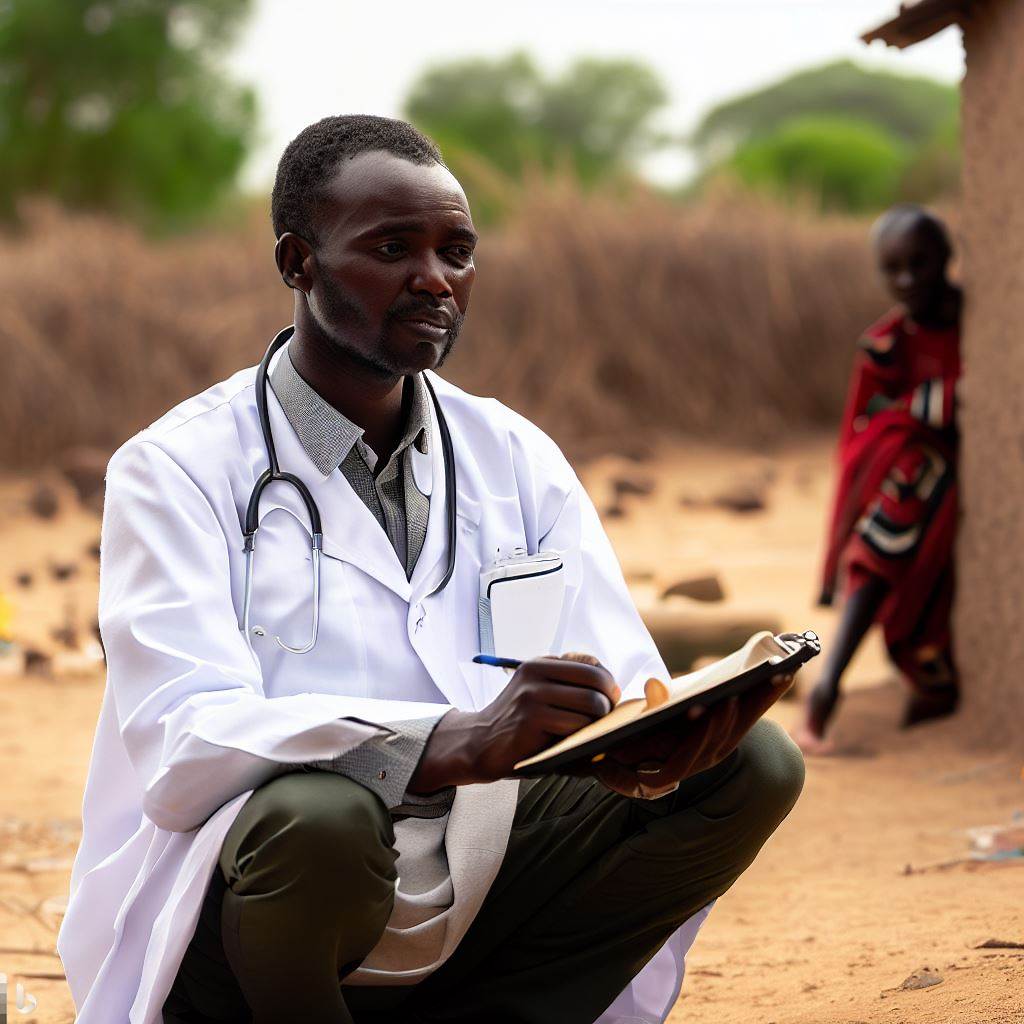Introduction
Nigeria, located in West Africa, has a thriving agricultural sector that plays a crucial role in its economy. The sector contributes to food security, job creation, export earnings, and rural development.
Veterinarians serve a vital role in Nigeria’s agricultural industry, particularly in the health and well-being of livestock.
They play a critical role in disease prevention, diagnosis, treatment, and ensuring the safety of animal products.
With a significant portion of Nigeria’s population dependent on agriculture for their livelihood, the wellbeing of livestock becomes paramount.
Veterinarians play a crucial role in improving animal productivity, health, and welfare, leading to increased income for farmers.
Additionally, veterinarians contribute to the prevention and control of zoonotic diseases, which can be transmitted from animals to humans.
By ensuring the health of livestock, veterinarians protect public health and mitigate foodborne illnesses.
Furthermore, veterinarians provide guidance on veterinary drugs, vaccines, and best practices for farmers, empowering them to make informed decisions about animal health and management.
Basically, veterinarians have a significant impact on Nigeria’s agriculture sector.
Their expertise and interventions contribute to increased productivity, improved animal health, safeguarding public health, and ultimately driving economic growth.
Role of Veterinarians in Nigeria’s Agriculture
Ensuring animal health and welfare
- Providing preventive care
- Diagnosing and treating diseases
- Performing surgeries and vaccinations
Veterinarians play a crucial role in Nigeria’s agriculture by ensuring the health and welfare of animals.
Through various tasks and responsibilities, they contribute to the overall well-being of the country’s livestock population and the success of the agricultural sector.
1. Providing preventive care
One of the primary roles of veterinarians is to provide preventive care to animals. They educate farmers about the importance of vaccinations, deworming, and other measures to prevent diseases.
By implementing these preventive measures, veterinarians help maintain the overall health of livestock and minimize the risk of disease outbreaks.
2. Diagnosing and treating diseases
Veterinarians are responsible for diagnosing and treating diseases in animals. They utilize their knowledge and expertise to identify the cause of illnesses and provide appropriate treatment.
Through regular check-ups and diagnostic tests, veterinarians can detect diseases at an early stage, allowing for timely intervention and preventing the spread within the livestock population.
3. Performing surgeries and vaccinations
Veterinarians perform surgeries, vaccinations, enhancing animal health, productivity, and welfare. Their impact on Nigeria’s agriculture is significant:
- Ensuring food security through disease-free animals and safe products.
- Boosting animal productivity by preventing diseases and providing treatment.
- Controlling and eradicating diseases to prevent economic losses.
- Improving animal welfare and promoting ethical practices.
- Generating employment and contributing to economic growth.
Essentially, veterinarians’ vital role in agriculture encompasses surgeries, vaccinations, disease control, and welfare enhancement, fostering a sustainable sector.
Read: Challenges and Opportunities for Nigerian Veterinarians
Impact of Veterinarians on Livestock Production
Veterinarians boost Nigeria’s livestock production through:
- Monitoring nutrition for balanced diets, enhancing growth and quality.
- Implementing effective breeding programs, selecting traits and improving stock.
- Designing vaccination plans, reducing diseases and economic losses.
- Conducting health inspections, promoting hygiene, and disease prevention.
- Performing diagnostic tests, collaborating for disease surveillance and control.
Their expertise ensures healthier livestock, increased productivity, and sustainable agricultural growth.
Read: An In-Depth Look: Radiation Therapist Profession in Nigeria
Veterinary Epidemiology and Disease Control
Monitoring and managing infectious diseases
- Carrying out disease surveillance.
- Epidemiological studies for disease control.
- Developing vaccination programs.
Veterinary epidemiology plays a crucial role in Nigeria’s agriculture by monitoring and managing infectious diseases.
The veterinary profession is at the forefront of disease surveillance, conducting epidemiological studies, and developing vaccination programs to protect animals and ensure food security.
1. Carrying out disease surveillance
Carrying out disease surveillance is one of the primary responsibilities of veterinarians. They actively monitor animal populations and identify any signs of infectious diseases early on.
This involves regular inspections, collecting samples for laboratory testing, and analyzing data to detect potential outbreaks.
Epidemic outbreaks often have devastating effects on livestock and can significantly impact agricultural productivity.
By actively monitoring and detecting infectious diseases, veterinarians can promptly implement control measures to prevent the spread of diseases and minimize their impact.
2. Epidemiological studies for disease control
Veterinarians also conduct epidemiological studies to better understand the patterns, causes, and risk factors associated with infectious diseases.
These studies involve gathering and analyzing data from affected animals, identifying the source of transmission, and assessing the effectiveness of control measures.
By studying disease transmission dynamics, veterinarians can develop strategies to prevent outbreaks and minimize economic losses.
This knowledge is invaluable in designing targeted control and prevention measures, such as improving biosecurity practices and implementing vaccination programs.
3. Developing vaccination programs
Vaccinations play a critical role in preventing and controlling the spread of infectious diseases in animal populations.
Veterinarians are responsible for developing vaccination programs tailored to specific diseases and animal species.
They conduct extensive research and collaborate with experts to determine the most effective vaccines and vaccination schedules.
By administering vaccines to susceptible animals, veterinarians bolster their immune systems and reduce the likelihood of disease transmission.
Additionally, veterinarians also educate farmers and animal owners about the importance of vaccination and provide guidance on proper vaccine administration.
These efforts help raise awareness about disease prevention and promote responsible animal healthcare practices.
Veterinary epidemiology and disease control have a significant impact on Nigeria’s agriculture.
Through disease surveillance, epidemiological studies, and the development of vaccination programs, veterinarians play a crucial role in protecting animal health, ensuring food security, and minimizing economic losses.
Their proactive approach to monitoring, controlling, and preventing infectious diseases is essential for sustainable agricultural practices in Nigeria.
Read: Comparative Study: Psychiatry in Nigeria and Other Countries
Veterinarians and Food Safety
The role of veterinarians in ensuring Nigeria’s food safety cannot be overemphasized. They play a vital role in safeguarding the health and well-being of consumers by ensuring the safe consumption of animal products.
1. Conducting inspection and certification of food products
Veterinarians are responsible for inspecting and certifying animal products that are intended for human consumption. This includes meat, milk, eggs, and other animal-derived products.
Through thorough inspections, veterinarians ensure that these products meet the required safety and quality standards before they reach consumers’ plates.
2. Monitoring drug residues and pesticide levels
Veterinarians are also responsible for monitoring the levels of drug residues and pesticides in animal products.
They ensure that animals used for food production are not treated with excessive amounts of antibiotics, hormones, or other substances that could be harmful to human health.
By monitoring these levels, veterinarians contribute to the reduction of antimicrobial resistance and ensure the safety of the food supply chain.
3. Implementing proper hygiene practices
Veterinarians play a crucial role in implementing and promoting proper hygiene practices in the food production industry.
They educate farmers and food handlers on the importance of maintaining clean and sanitary conditions in farms, slaughterhouses, and processing plants.
By implementing these practices, veterinarians reduce the risk of contamination and the spread of foodborne illnesses, ultimately ensuring the safety of animal products.
In essence, veterinarians have a significant impact on Nigeria’s food safety through their roles in conducting inspections and certifications, monitoring drug residues and pesticide levels, and implementing proper hygiene practices.
They work tirelessly to ensure that animal products intended for human consumption meet the required safety and quality standards.
By doing so, veterinarians contribute to the overall health and well-being of Nigerian consumers and strengthen the country’s agricultural sector.
Read: The Changing Landscape of Psychiatry in Nigeria: A Review

Veterinary Research and Development
Advancing Veterinary Medicine and Practices
Veterinary research and development play a crucial role in advancing Nigeria’s agriculture.
By constantly studying new diseases and treatment methods, veterinarians ensure the health and well-being of livestock and enhance the country’s agricultural productivity.
This section explores the efforts made by veterinarians in advancing veterinary medicine and practices in Nigeria.
1. Studying New Diseases and Treatment Methods
Nigerian veterinarians are at the forefront of researching and understanding emerging diseases that affect animals.
They conduct comprehensive studies to identify the causes, transmission patterns, and potential treatments for these diseases.
By staying updated on the latest advancements in veterinary medicine, they provide timely interventions to control and prevent the spread of these diseases.
2. Developing Innovative Techniques and Technologies
Veterinarians in Nigeria are constantly developing innovative techniques and technologies to improve animal health and production.
They collaborate with scientists, engineers, and agricultural experts to create better vaccines, diagnostic tools, and treatment methods.
These advancements not only enhance animal welfare but also contribute to the overall success of Nigeria’s agricultural industry.
3. Collaborating with Research Institutions and Organizations
The collaboration between veterinarians and research institutions/organizations is instrumental in the advancement of veterinary medicine in Nigeria.
Veterinary professionals actively engage with academic institutions, government agencies, and international organizations to exchange knowledge, resources, and expertise.
This collaboration fosters research partnerships and enables the implementation of evidence-based practices for the benefit of animal health and agriculture.
The impact of veterinary research and development is substantial in Nigeria’s agriculture.
It ensures the continuous improvement of veterinary medicine, which directly translates to better animal health, increased productivity, and sustainable agricultural practices.
By studying new diseases, developing innovative techniques, and collaborating with research institutions, veterinarians contribute significantly to Nigeria’s agricultural sector’s growth and success.
Challenges Faced by Veterinarians in Nigeria
Veterinarians in Nigeria encounter challenges impeding their effectiveness and growth:
Lack of infrastructure and resources
- Shortage of clinics, hospitals, labs limits animal healthcare.
- Inadequate equipment hampers diagnosis and treatment.
- Poor transportation access affects remote services.
Limited quality education and training
- Few schools restrict aspiring veterinarians.
- Outdated teaching methods hinder modern knowledge.
- Scarce specialized courses hinder specialization.
Insufficient government support and funding
- Low priority leads to inadequate financial allocation.
- Funding shortage hampers research and innovation.
- Lack of supportive policies exacerbates challenges.
Veterinarians’ contributions to agriculture are hindered by these challenges, requiring attention for progress.
Ways to Enhance the Role of Veterinarians in Nigeria
Strengthening veterinary education programs
- Introduce practical and hands-on training modules in veterinary education programs.
- Collaborate with international institutions to enhance the curriculum with the latest advancements in veterinary medicine.
- Provide scholarships and grants to encourage aspiring veterinarians to pursue their education.
- Establish partnerships between veterinary schools and local veterinary clinics to offer real-life experience to students.
- Encourage continuous professional development and specialization among veterinarians through workshops and seminars.
Promoting government collaboration and investment
- Advocate for increased government funding for veterinary infrastructure and research.
- Encourage the government to establish veterinary councils to ensure the regulation of the profession.
- Collaborate with the government to establish quality control standards for veterinary medicines and products.
- Promote public-private partnerships to develop veterinary services and facilities.
- Work with the government to develop policies that promote veterinarians’ involvement in agricultural planning and decision-making.
Improving access to veterinary services in rural areas
- Establish mobile veterinary clinics to reach remote rural areas with limited access to veterinary care.
- Provide financial incentives for veterinarians to work in rural areas and offer affordable services.
- Invest in telemedicine technologies to enable remote consultations and diagnosis.
- Train and empower local community members to assist with basic veterinary healthcare in rural areas.
- Work with non-governmental organizations to organize veterinary outreach programs in underserved rural communities.
By implementing these strategies, Nigeria can significantly enhance the role of veterinarians in its agriculture sector.
Strengthening veterinary education programs will ensure that future veterinarians are well-equipped with the necessary skills and knowledge.
Collaboration and investment from the government will provide the necessary resources and regulatory framework for veterinarians to thrive.
Basically, improving access to veterinary services in rural areas will lead to better animal health and ultimately contribute to the overall growth and productivity of Nigeria’s agriculture industry.
Conclusion
Veterinarians play a crucial role in Nigeria’s agriculture. They ensure the health and well-being of livestock, prevent and control diseases, and contribute to food security.
It is essential to support and recognize the valuable role of veterinarians in Nigeria’s agricultural development.
By providing them with adequate resources, training, and incentives, we can enhance animal health, increase agricultural productivity, and ultimately improve the overall economy.
Veterinarians are not just animal doctors; they are key drivers of sustainable agriculture and vital for achieving food security in Nigeria.
Their expertise in animal health and production management ensures a consistent supply of high-quality animal products, such as meat, milk, and eggs.
Additionally, veterinarians play a critical role in disease surveillance, prevention, and control.
Through regular inspections, vaccinations, and proper treatment, they mitigate the risk of outbreaks that can devastate livestock populations and threaten the livelihoods of farmers.
Furthermore, veterinarians contribute to agricultural innovation and research.
Their involvement in developing new techniques, improving animal genetics, and promoting sustainable farming practices leads to increased productivity and economic growth in the sector.
It is evident that veterinarians are indispensable for Nigeria’s agriculture.
Therefore, it is crucial for policymakers, farmers, and the general public to recognize their contributions and provide them with the necessary support to ensure their continued impact on the nation’s agricultural development.
Publish Your Professional Profile, Business or Brand
Showcase your expertise, gain trust, and boost visibility instantly on Professions.ng.
Publish NowLet us appreciate the veterinarians who dedicate their lives to safeguarding the health and well-being of our livestock and ensure a sustainable and prosperous future for Nigeria’s agriculture.




